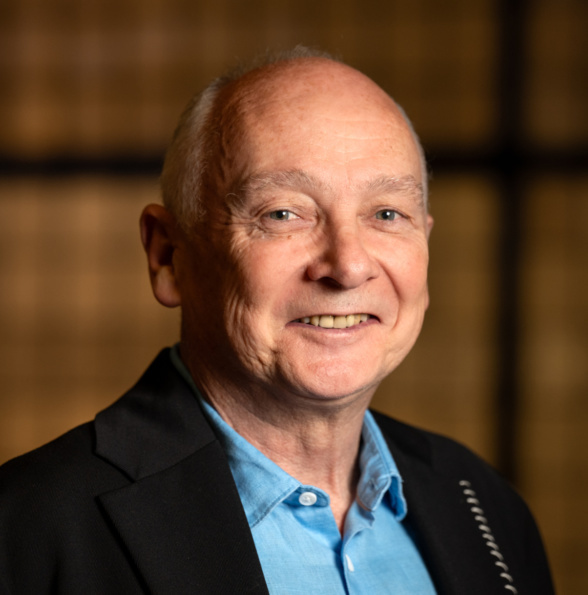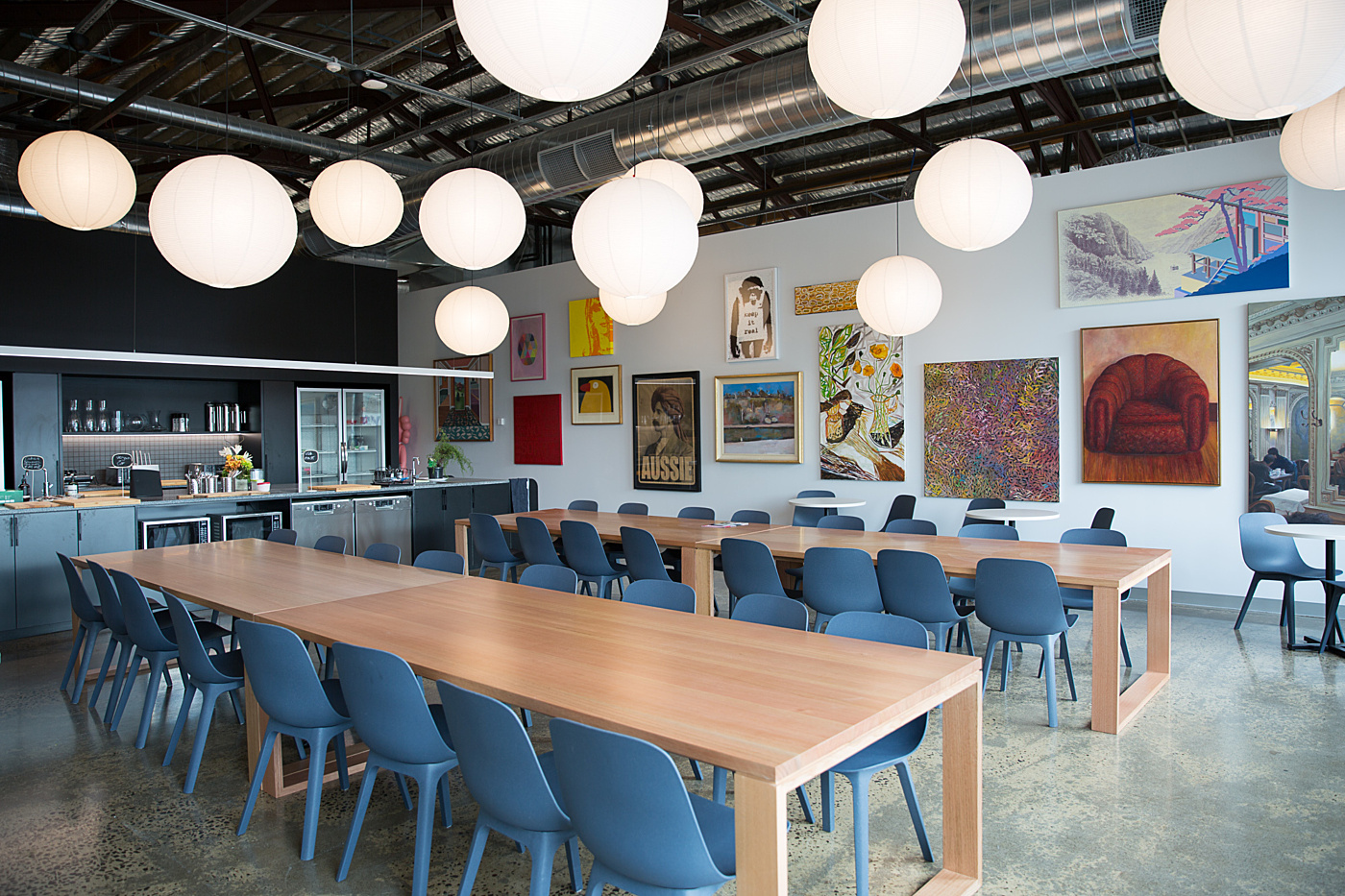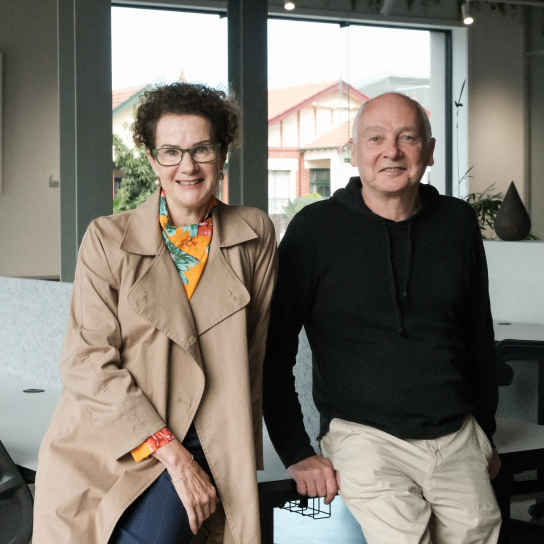
Twenty-five years on, Australia’s first social enterprise is going strong, and here’s why
Posted on 30 Sep 2025
I am proud of what Our Community, and its exceptional team, have achieved in the past 25 years. As…
Posted on 30 Sep 2025
By Denis Moriarty, founder and group managing director, Our Community

I am proud of what Our Community, and its exceptional team, have achieved in the past 25 years. As we quietly mark our anniversary, it’s made me take a moment to see where we’ve come from.
Our Community – a social enterprise before the term was coined – is basically a support organisation for not-for-profit organisations (NFPs) and a software vendor to government.
From a handful of people in 2000, we now have 100 staff working on sub-enterprises that include the Institute of Community Directors Australia (ICDA), SmartyGrants, the Funding Centre, GiveNow and Our Community House, home for scores more for-purpose people and organisations. I’m proud to say that several of our earliest workers remain with us – or have left and returned – which perhaps says more about our mission than the rest of the words that follow.
In my view of Australia’s political ecosystem, NFPs make up civil society, enabling citizens to do what government and commerce can’t – to build trust, cohesion, fraternity, and friendship outside the family and within the community. Individually, they range from billion-dollar behemoths at the top end – hospital groups, universities to country netball clubs and disability advocacy groups at the bottom. The total number of organisations, in a population of 26 million, has been estimated (well, guessed at; the quality of the statistics is poor) at about 600,000, of which only about 50,000 have enough money to merit employees, the rest being all-volunteer (my favourite kind).
Those at the top end have the heft to deal on an equal footing with other big players – governments, unions, lobby groups and mining companies – but the smaller ones are almost invariably struggling, there not being enough donations or volunteers or grants or governance expertise to go around.
That was where I started. Working in government in the 1990s I could see that there was an insatiable demand from small NFPs for information about grants and other funding opportunities.

Small community groups were attempting great things, but they were constrained both by problems of scale and by pervasive inefficiencies. If you were a small group that wanted to keep track of what grants were available for your organisation, for example, you had to buy your own copy of every Australian newspaper every Saturday and thumb through the classifieds.
That was a time, too, when the young world wide web appeared as an opportunity to level the playing fields used by giant companies and small triers – a bit like artificial intelligence (AI) today. The sector needed help with fundraising, training, collective organisation, and the exchange of information, and the technology was available to do all of that. I could see a chance to deploy resources better across the sector. I had the goal; I needed to find a path.
Because I’d been working within the not-for-profit sector, I initially thought what I wanted to build would have to be a not-for-profit itself. If I did it that way I would attract a number of tax breaks and be able to appeal to philanthropic foundations – and, within that pervasive ethos, I have to say that I assumed every commercial impulse was intrinsically suspect, if not out-and-out evil.
By the time I was putting the deal together, however, I’d had some first-hand exposure to the social sector in the US and the UK, and that wasn’t the message I was getting. The problems that I was trying to address in the sector actually, in many ways, stemmed from the constraints of working under a legal regime that was notably unfit for purpose. Australian charity law had been taken over wholesale from the British model, which was based on an Elizabethan law passed in 1604 – the year Shakespeare wrote Othello – embroidered over the next 400 years by bewigged and bourgeois English judges who unanimously favoured organisations that provided nourishing broth to the deserving poor over those bringing about meaningful change in society. The law had hardly caught up with printing, let alone the internet.
I could see another way, one in which a special kind of business could generate a large social benefit as well as a profit. I didn’t want to take on the fetters of being a not-for-profit, and I didn’t want to run a straightforward business. I wanted to break new ground in this country with a new thing that would reward its employees, that I could make some money from, and that would do good in the world. The more effort I put into it, the more money I could make, and the more money I could put back.
The initial funding for Our Community came from investors who were convinced by the combination of philanthropy and commerce. They weren’t looking for quick returns, and they weren’t expecting to multiply their capital, but they did expect that the enterprise would be run with a focus on sustainability and adaptability. We couldn’t just spend the money; there had to be a growth engine at the core. But they signed on to achieve social outcomes as well as profit.
Our initial social capital investors were visionaries, led by Carol Schwartz AO, one of Australia’s brightest business leaders and a visionary for so many men and women.
Since then, I’ve seen quite a few other organisations come into the sector via the other route, designed as not-for-profits, and on the whole they’ve confirmed my opinions. They come in, they get millions in funding from government, they pull together some training courses and a few web resources and a site to receive donations, and then their budgets dribble away in the sand and they quietly disappear, because they just don’t understand what it means to be a commercial entity. Business is hard – but it can be great.
We’ve had support investors poised precisely between commerce and philanthropy. From the beginning, Our Community was for-profit, but not only for-profit. A lot of what we provided was free, subsidised by our profit centres. Most of our online helpsheets were available to anyone, as was our advice line.
Events that involved major expenses, though, like our inspirational Communities In Control conferences, or sub-enterprises that were directed towards making money for the groups that used them, like the Funding Centre (our Australia-wide register of government and philanthropic grants), we charged for. Because our funding sources were purely commercial, we were able to give frank, no-bullshit advice to NFPs (as our sub-enterprise Community Directors does) without having to accommodate government pieties or legal bafflegab. We were able, too, to map out new projects as technology advanced.
In particular, we used our close relations with the community sector to find out where the shoe rubbed, and where we could prevent blisters. Increasingly, grantmaking was moving online; and because the software that ran this was being written from the perspective of the grantmaker rather than the grantee, untold days and months of volunteer time was being burnt out in frustration. We asked users what they wanted, and we produced SmartyGrants, a software system that let the sun shine through to both ends of the grant process. It’s a solution that’s now been adopted by grantmakers worldwide, and it’s revolutionised grantmaking.
We started with a handful of tech programmers working on the offerings of philanthropic foundations, and now we’re contracting with the governments of entire Australian states and moving internationally, most recently establising a UK, and Europe, office with staff. There’s a universal need to bring do-gooders together on a mutually rewarding basis with the government and private organisations that have money and want good things to happen, and I can assure you that to do that task well is resource-intensive (which means it’s hard for new startups) and needs a strong customer focus (which makes it difficult for purely profit-oriented businesses).

And what have I myself contributed to these positive developments? What distinguishes the leader from the passenger? Much management advice, in all sectors, boils down to “Don’t stuff it up,” and I am no exception.
I started with the resources to enlist a good team to provide expert, knowledgeable, accessible and helpful services, and I’ve mostly kept them enthusiastic, satisfied, and, above all, focused. As I say, enlisting followers is a matter of aligning goals, and my part in making this work is to keep the money coming in to pay good salaries and to minimise the strains of working here.
I’ve concerned myself closely with the office culture. I’ve tried for diversity, insisted on gender equality, set up our own building to allow for comfortable work conditions (and, I must admit, to provide enough wall space to hang an eclectic art collection), accommodated home working through the pandemic, and now moved to an enterprise-wide four-day week. There’s a strong group dynamic, and we’re able to keep at the front of the recruitment queue in a hotly contested market.

It does help that I can offer my staff a sense of purpose that isn’t simply financial. In all our dealings with the field – with the people who take our training courses, the people who operate emergency helplines, the people who serve coffee at our conferences – it’s possible to observe that people at the pointy end, people with hands-on care duties, people heading progressive movements, like us and need us. People want to think well of themselves, and working at Our Community does make that easier. It's made it possible to assemble an amazing team who can open new lines of thought, rescue projects where I’ve gone a bridge too far, and pull me back into line when I’m talking crap (unless I’m particularly keen on it). They work here because it’s fulfilling.
To get a sense of that mission, have a look at the Our Community Manifesto, which all staff sign up to when they join the company.
There’s a strong sense in Our Community that striving for perfection is madness, because perfection is rarely achieved and the world passes you by while you try (we operate instead by a shared belief in “Ready, fire, aim”, which is how innovation truly comes about); a belief that technology can revolutionise markets; and a fundamental belief that you need to love people.
You can’t, in this era, really make people do anything they don’t want to, and with that restriction the job of a leader is that of bringing other people’s wants into line with what the leader wants. Once you have a gang together the leader is then faced with finding a way through the world and its pervasive discouragements.
The barriers leaders have to cope with – legal, financial, social and cultural, ecological – rule out most possible initiatives and constrict others, till the job of the leader reverts to guiding the enterprise through a jumbled maze and the ultimate goal settles back to doing the next thing. If, as Engels said, freedom is the recognition of necessity, leadership consists of finding a walkable path forward through reality, day by day, in close to the right direction. And I do that.
It helps that I enjoy working here myself, and I enjoy my life. For myself, I’ve kept in touch with the sector’s needs by continuing my involvement with organisations working against homelessness and domestic violence. My partner Brendan is involved and supportive. We have adopted two children, and I was on their school council, where I tried to steer the surrounding culture in less dogmatic and boring directions.
Every new employee at Our Community is given our manifesto and encouraged to live these values.
The estuary region where rigid order and random chaos neaten generate high levels adaptation, complexity and creativity.
But what is it about Our Community that’s got it where it is today? What is it about social enterprises that needs a different approach from your average mining company, or corner store?
Because Our Community’s goals aren’t purely financial, they’re harder to measure objectively, and they need judgement to balance. Working between wind and tide to keep the enterprise on course is a constant concern. As we say in our helpsheets and manuals devoted to the chairs and boards and committees of NFP governance, financial control is good (indeed, essential), and compliance with the rules is good (ditto), but what governance is for is to keep the organisation pointed towards its goal. And that’s true for Our Community, too.
The main reason Our Community isn’t a not-for-profit is that I wanted to retain the commercial incentive to make our services work to the maximum. That said, one of the goals of our own governance structure is for both the board and me as CEO to be able to remind each other not to be greedy – which is why we have an ethicist on the board. There’s always the temptation, given the universal need for something like a grants portal, to try to extract the maximum from both sides – to give as little service as we can get away with, and to charge as much as possible for each element of the service we do provide.
You could, I suppose, argue that immediate revenue maximisation would be short-sighted anyway, and that a better balance is important in maintaining credibility with the sector, but I can assure you that it’s a lot easier to make the argument for the long view to the board when the initial agreement that we were a social enterprise meant that the investors were prepared to wait 20-odd years to get their money back. We do, genuinely, want to see the Australian community sector and beyond prosper.
I could quote the figures as to how we’ve helped community groups overall – the hundreds of millions of dollars in donations passed through our donations platform, GiveNow, the hundreds of thousands of grant applications processed through SmartyGrants, the thousands of training courses, the educational newsletters and the helpsheets and manuals produced by Community Directors, the conferences and submissions to government – but I can’t imagine you’d thank me. It all works, is the takeaway.
“One of the greatest lessons in the Our Community journey – and one that has shaped me, my life and our business – is a deep appreciation and understanding of ethics.”
We were one of the first companies in Australia to be accredited as a B Corporation (we were among the top 10 per cent of B Corps in the world in the category of “best for the community”), a process that provided external validation of our social credentials. In 2020 we ceased our B Corp accreditation, in favour of legally mandating our social mission, becoming one of the first companies in Australia to enshrine our values in our Constitution, which states “commercial imperatives are afforded equal priority to our social mission, our commitment to employees, and our responsibility to the environment in which we work”.
One of the greatest lessons in the Our Community journey – and one that has shaped me, my life and our business – is a deep appreciation and understanding of ethics. I was awarded a Vincent Fairfax Ethics in Leadership scholarship 30 years ago, and it was a seminal moment. My studies were led by the philosopher and ethicist Dr Simon Longstaff of the Ethics Centre, who is now on the board of Our Community. That scholarship program taught me to be a more authentic and ethical leader; it was the antithesis of an MBA, and it is etched in my brain and soul and has shaped every difficult and strategic decision I have made.
The ethics journey also taught me about love. It’s one of the great lessons. It sounds a little hippyish and wacky, but government and business leaders could learn so much from practising love. At one of our community sector conferences, Rick Morton, the brilliant journalist who relentlessly investigated the Robodebt scandal, asked the question “What would it look like if our government loved those people it was sent to serve?”. Hence, Our Community wrote a collective letter to Australian governments urging them to deploy love. We wrote:
“Governments – all of them: federal, state and local; left-leaning or right-leaning – need to stop hiring consultants to tell them how to reinvent systems. They need to send a simple message to every public servant across the land: What would it look like if a government loved its citizens? Show us what that looks like.”
The power of commercial success is that in the end you really don’t have to answer to anyone except your accountant. I’ve used this freedom to take risks (like that Love Letter) and drive towards new possibilities. And what I’ve added to the mix is summed up in the Manifesto that hangs out the front of the Our Community office.
As Our Community marks its 25th anniversary, I would feel confident that we were close to achieving what I’d set out to do – if it wasn’t that in the past 25 years the structure and practices and challenges of the sector have changed so dramatically and all our practices have had to be adapted and reassessed to match. There’s no end to it, and the primary reward for doing the work is that people let you keep on doing it.
We're proud to take a stand on progressive issues. Here are more recent opinion pieces.

Posted on 30 Sep 2025
I am proud of what Our Community, and its exceptional team, have achieved in the past 25 years. As…

Posted on 18 Dec 2023
About this time of the year people start circulating estimates of what proportion of Christmas…